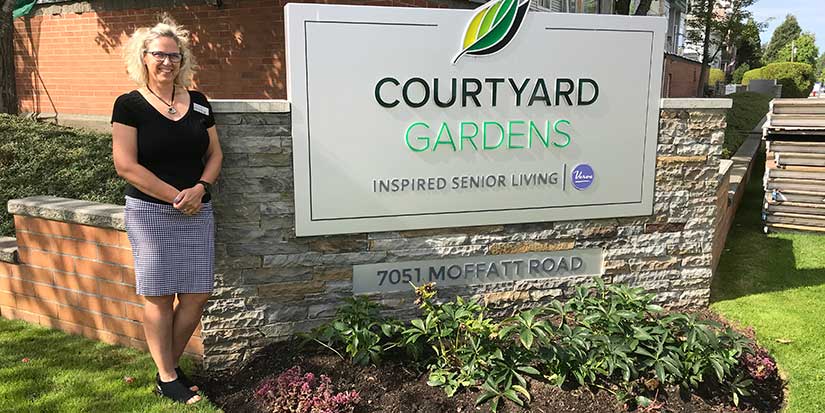Latest News
A compassionate move lauded by all
—
There is hope. Until recently, if you lived in an assisted living residence or a supportive recovery house and needed more than two extra services from a long laundry list, you had to move out, often to a residential care facility.
A frail senior’s health can take an unexpected downturn. They suddenly require more help to live independently.
Richmond’s Amanda Hill is the general manager of Courtyard Gardens Retirement Residence on the corner of Granville Street and Moffatt Road. Her facility has many care levels including assisted living.
“Anything that the government does that creates more choices for families and residents is a benefit, rather than a decision having to be made quickly,” Hill says.
Now, with amendments coming to the provincial Community Care and Assisted Living Act, people living in those situations, which preserve dignity and a degree of autonomy, will be able to stay even if they need more than two extra services.
Hill says, “Previously, they’d feel pressured to make a decision because of government regulations.”
The list of care options hasn’t changed. What has changed is that people no longer have to leave their homes if they need more than two things from the following list:
-assistance with the activities of daily living,
-managing medication,
-provision of and monitoring therapeutic diets,
-behaviour management,
-psychosocial supports,
-safekeeping of money and personal property.
“Many seniors in the past have had to make the difficult decision to leave their assisted living residence, which is their home, due to previous restrictions,” said Adrian Dix, Minister of Health. “That’s why we are empowering seniors and people living with disabilities with more independence to make choices about where and how they live and receive care.”
Effective Dec. 1, 2019, these changes and new regulations will give seniors, people living with disabilities and community-care clients, as well as people living in supportive recovery homes, the flexibility to stay in their community, while ensuring that they get the quality of care they need. It is a decision that blends fiscal responsibility, practicality and empathy for those living in these situations.
Hill says, “Where more options and more access is available, it is a positive for any senior in assisted living.”
The provincial government defines assisted living as a semi-independent type of housing that provides extra supports to help with activities of daily living, such as meals, recreation, medication management and psychosocial supports.
In supportive living, seniors live in their own apartments and have some or all of their meals provided in a restaurant setting within the building. Some provide weekly housekeeping and many offer services such as reminding people to take their medications on time, help with bathing, and meals that work with medical dietary needs. Like living on a cruise ship, the residents have a host of activities and outings to choose from. They can come and go as they wish.
Local MLA for Richmond South Centre, Linda Reid, knows the realities of caring for an elder both personally and as BC’s official opposition member of the legislature responsible for seniors’ care.
“Richmond is a diverse community and the greater the range of choices the better for all. I’m happy to support ever increasing options in seniors care,” Reid says.
The changes mean seniors and adults requiring support in their recovery as well as people living with disabilities, have the choice to live independently in a home-like setting. Accommodations in these programs range from private rooms in a home to an apartment-style building with suites.
The amendments address the challenges of being transferred to long-term care sooner than necessary because of the existing rules which limit assisted living residences to providing no more than two of the prescribed services.
As a result, seniors who required more than two prescribed services were unable to continue living in assisted living residences, even though they may have been safe and may not have needed the more intensive care provided by long-term care homes. The amendment removes this restriction, creating more choices and opportunities for seniors to exercise their independence. This amendment also saves taxpayers money by saving the cost of unnecessarily high levels of care found in a residential long-term care facility. Once again, practical kindness is cost-effective.
The changes also increase regulatory oversight for assisted living residences and supportive recovery homes to strengthen protections for residents. Through these amendments, the province of British Columbia will have enhanced oversight powers to ensure the health and safety of residents, including the ability to conduct routine and monitoring inspections and to take action where there is an immediate risk to the health or safety of a resident.
It will also offer residents more protection by adding oversight to make sure the facilities are up to standard and those running them are qualified to do so.
These changes do not affect just seniors, those rebuilding their lives now have more hope as well.
This is something Guy Felicella, who grew up in Richmond, knows only too well.
As a peer clinical advisor at the Overdose Emergency Response Centre and the BC Centre on Substance Use for the Vancouver Coastal Health regional addiction program, he knows clients need compassion, stability and informed help. As someone who once used street drugs, he knows first hand how important continuing support in a recovery residence is.
“The last thing a person suffering in substance use should have to worry about is the safety or integrity of their recovery centre. Every person deserves the same quality of care and protection no matter where they seek treatment in the province,” he says.
As well, new regulations will also increase accountability and oversight of supportive recovery homes throughout B.C. by ensuring employees have necessary skills and training, providing programs and policy information to people and families, supporting transition to connect to services and supports when leaving recovery homes, and developing a personal service plan for each resident’s recovery.
“When people and their families turn to supportive recovery homes for help, they have the right to receive safe, quality care,” said Judy Darcy, Minister of Mental Health and Addictions. "With these new regulations, the Province is working to ensure that the health and safety of people on their recovery journey is front and centre when receiving the services they need.”
Keir Macdonald, CEO of the Phoenix Drug & Alcohol Recovery & Education Society says this announcement, “is a strong step towards building a safer and more reliable range of recovery services in B.C. Service providers, families and individuals seeking resources to help address problematic substance use, need confidence that the houses they are accessing or referring to, are regulated and meet minimum standards.”
The new regulations’ oversight will ensure more safety and more chances for those in both recovery facilities and independent living to stay in their chosen home.
Hill, who has worked around elders most of her adult life, says, “Seniors have wisdom and experience. Just because they can’t remember what they had for breakfast, they still deserve respect and empathy.”
To learn more about assisted living in B.C. go to
https://www2.gov.bc.ca/gov/content/health/accessing-health-care/home-community-care/care-options-and-cost/assisted-living
For more information about mental health and substance use residences go to































